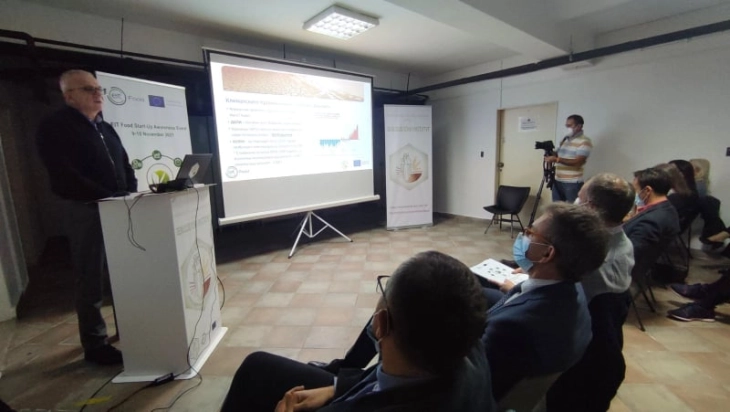Sustainable innovations in agriculture required for managing climate change: forum

Skopje, 9 November 2021 (MIA) – Agriculture is one of the most vulnerable sectors, largely impacted by climate change. Young agriculturists and students should propose innovative solutions, fit to grow into startup businesses aiming to improve the sector, said participants at a forum organized by the Skopje’s Institute of Agriculture on Tuesday, as part of the „EIT Food Start-Up Awareness Event” project.
They underlined that Earth's average global temperature has risen by approximately 1C in the past 100 years, as well as 1.9C in the period 2011-2020, compared to the period before 1990. Growing food in these conditions is a major challenge, while the quality and quantity of production is at risk of declining. Therefore, sustainable innovations in agriculture are required for managing climate change like never before.
Agriculture Institute head Viktor Gjamovski said that agriculture is at the center of the climate crisis due to its vulnerability and the fact that it’s a greenhouse gasses emissions source. However, he added, it can also be a solution.
“Heat waves, wildfires, extended draughts, winds, storms and floods have become the new reality. Climate change and extreme weather conditions endanger ecosystems and food safety amid increase in global food demand. Agriculture is at the center of the climate crisis due to its vulnerability and the fact that it’s a source of greenhouse gasses emissions. However, he added, it can also be a solution, by returning carbon to the soil. Soil has potential to store carbon and mitigate the effects of climate change, which means that climate-smart agriculture practices can be part of the solution. Digital tools are already helping growers develop more eco-friendly and efficient production processes,” Gjamoski said.
According to professor Dushko Mukaetov, we’ve committed to reducing emissions by 51% by 2030 compared to 1990 levels, i.e. by some 29% in agriculture.
“The low scenario projects a rise of 1.5C by 2100, the medium – a little over 2C, and the high – a very bleak situation. In regard to rainfall, the first scenario foresees a slight increase, the second – a 20-30% decrease in summer, and the third is even worse,” the professor said.
The fifth stage of global climate change reports shows that we’re witnessing a new geological epoch – the Anthropocene.
The forum is set to resume on Wednesday. The „EIT Food Start-Up Awareness Event” project is financed by the food innovation initiative of the European Institute of Innovation and Technology, backed by the European Union.







